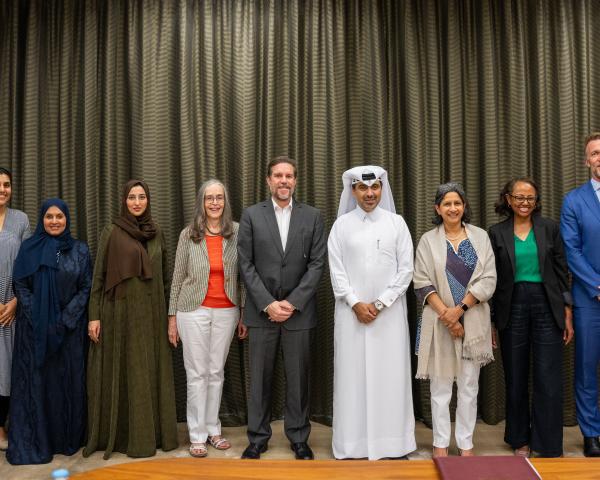In a powerful step toward building a better future for children around the world, the World Bank and the State of Qatar have announced a new partnership to address the global education crisis. This joint effort, launched in September 2024, aims to tackle one of the biggest challenges of our time: ensuring that all children, no matter where they live, can receive a high-quality, inclusive education.
This partnership is especially focused on ending learning poverty – a situation where children cannot read and understand a simple story by age 10. In many developing countries, more than 50% of children face this challenge, according to the World Bank. This initiative by Qatar and the World Bank is a bold commitment to turn that number around.
🎯 A Shared Mission for Lasting Change
The partnership was officially announced during high-level meetings between representatives from Qatar and the World Bank Group. The goal is clear: build stronger, more inclusive education systems in low- and middle-income countries. The focus will be on not just increasing access to schools, but improving the quality of education children receive when they get there.
This collaboration brings together Qatar’s growing investment in global education and the World Bank’s deep expertise and reach in over 100 countries. Together, they are aiming for real, long-term impact.
🧒 What Is Learning Poverty, and Why Does It Matter?

Learning poverty is a relatively new but critical concept. It refers to the percentage of 10-year-olds who are unable to read and understand a basic text – a key milestone in a child’s education.
If a child cannot read by age 10, it becomes much harder for them to learn anything else. Reading is the foundation of education, and without it, children fall behind in every subject. Unfortunately, the COVID-19 pandemic made this crisis even worse. School closures and learning disruptions hit the poorest communities the hardest.
The World Bank and Qatar’s new plan aims to address this head-on with solutions that work on the ground – not just in theory.
🔍 What Will the Partnership Do?
This is not just about throwing money at the problem. The initiative is structured to support specific, measurable changes in education systems. Key areas of focus include:
1. Policy and Reform
Helping governments create smart, effective education policies that ensure all children have access to learning opportunities – especially girls, refugees, and children with disabilities.
2. Teacher Support
Investing in training and professional development for teachers, so they have the tools and knowledge they need to help children learn effectively.
3. Data and Measurement
Using real-time data and research to monitor progress and adjust strategies. This ensures that funding and effort go where they’re needed most.
4. Innovation in the Classroom
Supporting new teaching methods, digital tools, and community-based education programs that can scale across different countries.
🤝 Statements of Commitment
Leaders from both Qatar and the World Bank expressed their excitement and commitment to the new partnership.
Axel van Trotsenburg, Senior Managing Director of the World Bank, said:
“Education is a human right. With this partnership, we are putting our full weight behind the mission to ensure every child can learn. We thank Qatar for its leadership and look forward to seeing this partnership transform lives.”
Dr. Hanan Al Fayyad, a representative of Qatar’s education initiative, echoed the sentiment:
“Qatar is committed to building a better world through education. We believe that no child should be left behind. Our partnership with the World Bank is a powerful step toward that goal.”
📈 A Long-Term Vision for Global Impact
This isn’t a one-time campaign—it’s a long-term plan. The partnership will roll out over several years with support for pilot projects, research hubs, and regional programs in countries across Africa, Asia, and Latin America.
Already, several countries have expressed interest in joining this new initiative. The World Bank and Qatar plan to offer both financial and technical support to help them develop strong, results-driven education systems.
The plan includes a focus on early childhood education, basic literacy and numeracy skills, and secondary school access – all with an eye on reducing the education gap between rich and poor.
🌐 Why This Matters Now
The timing of this partnership couldn’t be more important. The world is facing a growing education crisis. According to the latest World Bank data:
- Over 70% of 10-year-olds in low-income countries are considered “learning poor.”
- More than 250 million children are out of school entirely.
- Even when children do go to school, many are not learning the basics they need for future success.
Without urgent action, this could result in a generation left behind—unable to meet the demands of the modern economy, and at risk of poverty and inequality for decades to come.
By acting now, the World Bank and Qatar hope to change the course for millions of children.
🏁 Final Thoughts
The World Bank-Qatar partnership sends a strong message to the global community: the future of education is everyone’s responsibility. While governments, schools, and communities play essential roles, collaboration at the international level is critical to solving problems that are too big for any one country to handle alone.
With this new initiative, hope is rising for a world where every child can go to school, learn well, and dream big—regardless of where they are born.



